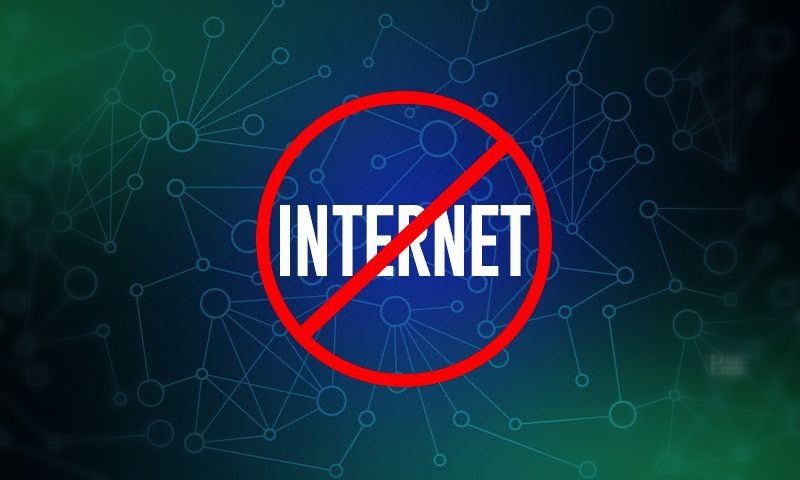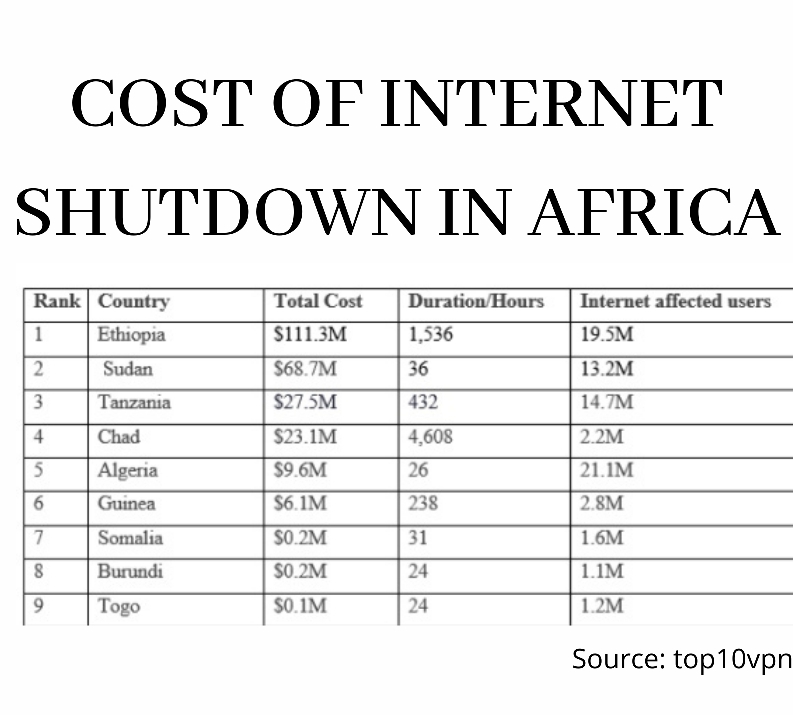Economic Effects of Internet Shutdowns in Africa

Internet, especially, social media shutdowns have become a regular feature in Africa. Since 2007, when Africa witnessed its first digital blackout in Guinea, shutting down of the internet and telecommunication service has become a consistent option in the playbook of African leaders as 26 out of the 54 states in Africa have witnessed network restrictions in varying degrees. There have been complete or partial shutdowns and they have varied in duration, regularity and geographical range.
Interestingly, the justifications for these shutdowns usually go along the lines of protecting citizens from misinformation and fake news, quelling riots and protests, or as weak an excuse as preventing exam malpractice. But is this the case?
In spite of all the justifications given by African governments, the underlying reasons for a shutdown usually have to do with silencing dissidents, frustrating opposition and critics, or covering up acts that can be considered war crimes.
The adoption of these tactics can be traced to the effectiveness of an internet shutdown in quelling social unrest and anti-government rallies during the Arab Spring. African leaders have come to embrace this model as the go-to strategy for frustrating citizens and muzzling dissent.
The egalitarian nature of the internet has given individuals and groups the opportunity to easily connect, share information and mobilize groups for mass social actions. This is one feature of the internet that many governments are afraid of; that one day, a revolution on the scale of the Arab Spring would occur in Africa with the internet fueling the movement. When that occurs, the revolution will not have to be televised; it will very easily be streamed live.
For example, during the EndSARS protest in Nigeria, organizers used social media to share information, crowd-fund and mobilize young people to come out en-mass to protest against police brutality and general failure in governance. The effectiveness of this campaign was largely dependent on the speed of communication and interconnectivity of people on social media.
In the wake of this mass protest, the Nigerian Government, disturbed by the conversations brewing online, tried to reintroduce a bill – that had been previously rejected – that would allow for the regulation of social media and give the government power to shut the internet at will.
There is also the concern that the internet as a ground for facilitating discussions can easily be used to stoke violence. People with this view have equated the internet to the role the radio played in advancing divisive rhetoric and hate speech, promoting fear and using it to mobilize for violence in the Rwandan Genocide. Due to African governments’ inability to control conversations and what people share online, they have found justification to introduce the internet blackout.
During the General elections in January 2021, the Ugandan government ordered telecommunications service providers to shutdown internet service in the country. This action was taken a day after all social media platforms were banned.
Shutdowns during elections do not just stifle opposition or silence critics; it also prevents journalists and observers from communicating their findings and verifying information in the course of the elections, as experienced in Uganda.
There are mainly three categories of internet shutdowns, and they vary according to the whim of the government enforcing them. Internet blackout is when access to the internet is completely cut off. This extreme measure cannot be directly circumvented.
Social media shutdowns, however, refer to the restriction of access to social media platforms such as Facebook, Twitter or YouTube. In this case, people can evade this by using Virtual Private Networks (VPN).
Lastly, there is severe throttling, this is a case where access to the internet has been reduced to 2G speeds, this can allow calls and SMS but it renders modern websites and apps totally unusable. This is almost like an internet blackout but with a milder effect.
Governments in many African countries are increasingly engaging in the worrisome behaviour of restricting internet access to citizens without really understanding the economic and social consequences of their actions. Perhaps, this could somehow explain why it has become prevalent in Africa; because the governments ordering the shutdowns do not know the impact of their orders on the economy.
Counting The Costs: How Internet Shutdowns Affect Businesses And The Economy
According to a report by top10vpn, the world economy – already embattled with the COVID-19 pandemic – lost over $4.01 billion to internet shutdowns in 2020. This represents a 50% decrease in impact compared to $8.05 billion in 2019.
The numbers show a lower economic impact from the previous year because most of the shutdowns happened in low-income countries. India and Myanmar accounted for the longest duration of shutdowns, with restrictions originally imposed in 2019 continuing well into 2020.

As the table above shows, Ethiopia tops the table with the longest duration of shutdowns in 2020 with a whopping $111.3M in revenue loss. Sudan takes second place with $68.7M in revenue loss in the year under review. While Tanzania comes a distant third with $23.1M in losses.
Chad ranks 5th place in the chart with $23.1M in revenue losses; it had the longest duration of shutdown in 2020 with 4,608 hours. When calculating the cost of a shutdown, one must also take into consideration the size of the economy, number of affected users and network infrastructure.
While the political, human rights, and social dimensions of internet shutdowns are more obvious, the economic and livelihood impact is less known and hardly spoken about when analyzing internet shutdowns.
These restrictions can cause great setbacks, in terms of ease in doing business, income and revenue loss for businesses and SMEs that require network access or primarily use social media platforms to promote their businesses.
In a continent with abysmal internet penetration records, these shutdowns alongside other obnoxious regulations and laws are deliberately meant to stifle free speech and pose a threat to the growing democracies in Africa. Beyond that, it portends grim economic conditions for citizens of the country as the livelihood of the citizens and the economy of the country is impacted greatly.
Finally, it has become apparent that internet shutdown measures are hardly effective in stopping protests or dissuading citizens from taking a civil action against the government, as seen in the Arab Spring movement. Rather than restrict or shutdown internet use, governments in Africa should be better advised on the very real problems they create for themselves when they shut down the internet in their countries. They could do better by collaborating with media, tech and telecommunications companies, and civil society groups to address concerns of abuse, misinformation and fake news that could cause social unrest. Or, they can simply listen to what their people have to say.